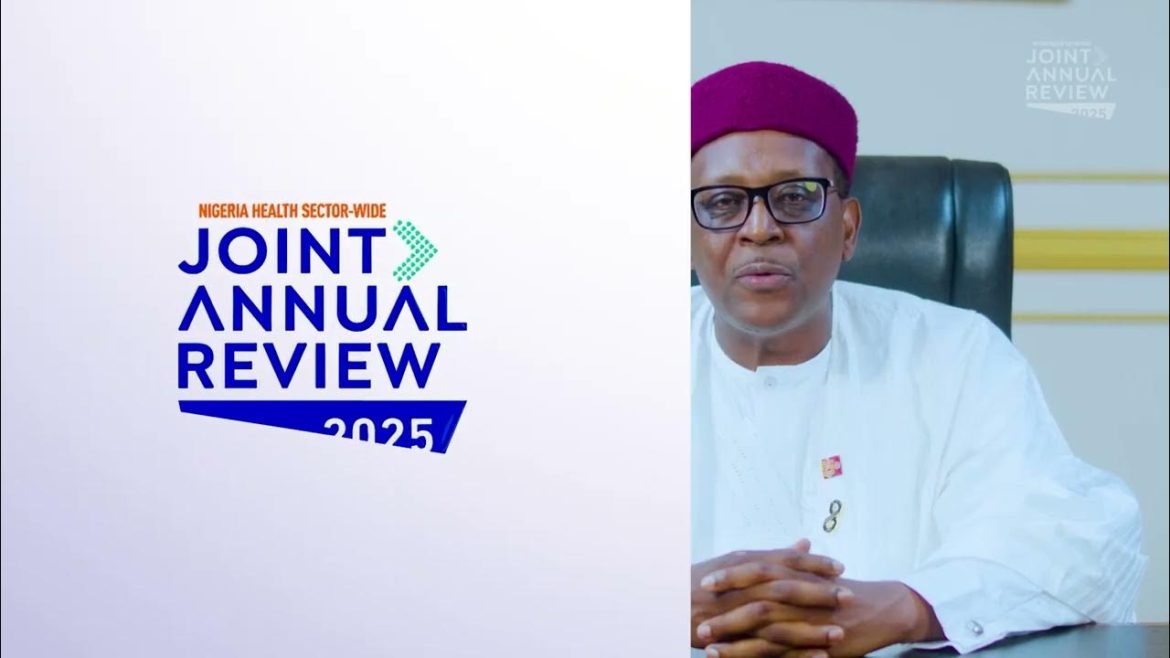By Iyemah David
Nigeria has at the close of the 2025 Health Sector–Wide Joint Annual Review (JAR), adopted a new national framework to strengthen accountability, financing, governance and service delivery in the health sector.
The is contained in the communiqué at the end of the three days annual review event read by the Permanent Secretary, Federal Ministry of Health and Social Welfare (FMoHSW), Ms Daju Kachollom.
The 2025 JAR assessed national and state-level progresses under the Sector-Wide Approach (SWAp) and aligned collective action toward the Nigeria Health Sector Renewal Investment Initiative (NHSRII) and Universal Health Coverage (UHC).
Chaired by the Coordinating Minister of Health and Social Welfare, Professor Muhammad Ali Pate, and the Minister of State for Health, Dr Iziaq Salako, it incorporated sub-national JARs conducted across all states.
A major highlight of the review was the signing of the UHC Compact Addendum, which expands the 2023 compact beyond federal and state governments to include LGAs, private-sector partners, traditional and religious institutions and other ministries.
The expanded compact clarifies mutual accountability through a strengthened “Ask-and-Offer” framework and integrates emerging health priorities.
According to the communiqué, delegates witnessed the inauguration of several national tools and strategies designed to create an integrated planning and monitoring ecosystem.
These include the National CEmONC Facility Readiness Assessment, the Climate and Health National Adaptation Plan, the Second National Action Plan for Health Security (NAPHS-2), and the Mini-DHS Framework for annual outcome measurement.
Others were the PHC revitalisation dashboards, the BHCPF digital platforms, and the NHIA’s digital claims platform.
The N-CAS “One Plan, One Campaign, One Frontline” strategy was also unveiled as part of the integrated approach.
The communiqué also noted that officials reported early gains under the Maternal and Neonatal Mortality Acceleration Initiative (MAMII), noting about 17 per cent reduction in maternal deaths in early-implementing LGAs.
It noted that the neo-natal mortality trends were also improving, driven by increased antenatal care uptake and improved referral pathways.
It said that only 32 per cent of assessed facilities currently met minimum Comprehensive Emergency Obstetric and Newborn Care (CeMonc) readiness.
The communique however said that persistent shortages in blood supply continued to undermine emergency care in several states.
It said that there were improvements in PHC functionality, including expanded 24-hour service availability, more reliable electricity and better water, sanitation and hygiene standards.
The communiqué also noted chronic staffing shortages, especially in rural LGAs, commodity stockouts and limited emergency obstetric capacity still impeded service quality.
It said that a first-of-its-kind dialogue on corruption and fiduciary risks exposed critical gaps such as ghost workers, irregular payments, double expenditures and weak fiscal tracking within the BHCPF and PHC systems.
It further said that stakeholders unanimously agreed on the need for stronger digital expenditure tracking, routine audits and biometric attendance systems to improve transparency.
The communiqué further warned that tightening fiscal conditions and declining external financing, especially for immunisation, could affect programme continuity.
“While more than 2.4 million vulnerable Nigerians are currently enrolled under BHCPF and state insurance schemes, delayed release of domestic funds and unpredictable counterpart financing remain a major threat.
“Reforms under the Presidential Value Chain Initiative have attracted over 40 private-sector partners, with early gains in local production of syringes, PPE and essential commodities.
“Government reiterates its commitment to operationalising Medipool and transitioning at least 20 priority commodities to local production, with five new manufacturing plants planned by 2026,” the communiqué said.
The communiqué added that stakeholders resolved to accelerate the operationalisation of the UHC Compact Addendum in the first quarter of 2026 through a co-created implementation framework.
It said that stakeholder’s greed to introduce biometric verification across all PHC and health-insurance platforms to eliminate ghost workers and strengthen workforce accountability.
According to the communiqué, however, digital expenditure tracking and biometric attendance systems are to be rolled out across all BHCPF facilities by the third quarter of 2026.
“Other resolutions include establishing a national Human Resources for Health programme with new cadres of health workers, scaling up MAMII nationwide.
“This is with stronger community engagement, strengthening sexual and reproductive health access by addressing family planning stockouts, and improving readiness across Basic Health Care Provision Fund-supported facilities.”
It also said that delegates further committed to deploying PHC financial-management systems to reduce fiduciary risks, enrolling five million Nigerians into health insurance, including one million additional vulnerable persons.
According to the communiqué, this will ensure full release of Nigeria’s immunisation counterpart funding under the revised Gavi accountability framework.
“Delegates also pledged to strengthen LGA readiness, improve referral systems, and expand National Emergency Medical Service and Ambulance System.
“They pledged to strengthen the Rescue and Emergency Stabilisation Medical Teams operations and enhance Drug Revolving Fund accountability.”
The communiqué further said that stakeholders endorsed the adoption of data-guided resource allocation, comprehensive resource mapping and regular public expenditure reviews to support transparent and efficient programming by both government and partners.




